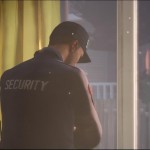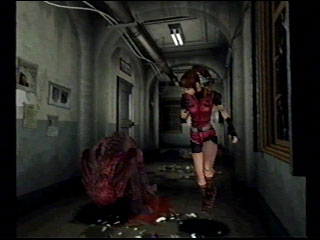(Some spoilers for the first three episodes of Life is Strange here, but painted in broad strokes.)
Now that we’re halfway through Life Is Strange, with two episodes to go, the game is shaping up to be quite the experience. While some of the major plot events are so heavily foreshadowed as to be guessed, it’s the handling of them, and the humanization, that has kept me playing, and in fact, has increased my investment over time. With each episode, I’ve become more fascinated with these stories, and these characters, and I find myself willing to forgive flaws and unsteady moments of gameplay in service to the larger narrative and mysteries, despite the fact that at first, I had the opposite reaction. I was intrigued, but not invested, and I found some of the characterization bland and too simple. Collectively, we discussed flaws and strengths of the first episode, and we’ve explored more deeply as the game has developed, but after finishing episode three, I feel like the characters have come into their own, that they are far more nuanced and intriguing than I would have guessed.
 Some of the game’s characters have always seemed stronger than others. From the very first episode, we’ve had reason to question Mark Jefferson, for instance; there’s a rumor he had an inappropriate relationship with a student, and he’s overbearing and pretentious, but seems to have student interests at heart until a difficult moment in the second episode. At any given point, it’s hard to read him; he is he a good guy? Is he shady? The real answer, at the point in the narrative, seems to be neither, and we don’t know enough to judge everything yet, so for now, we’ll leave him as just a person, with good qualities and bad. David Madsen, too, has been a layered character from the beginning. He’s an asshole, sure, but is he just looking out for everyone? Is he actually suspicious, or do we think he’s suspicious because we’re looking at him through the eyes of teenagers? As the story has developed, we’ve found out more and more about David, about his past and his motivations, and in the end we’re left with a man who genuinely seems to love the wife and stepdaughter he also spies on, a man who has undoubtedly suffered after combat duty, and a man who has made some poor decisions despite trying to do good. He’s just a man, neither good or bad, and with each episode, we learn more and more about him.
Some of the game’s characters have always seemed stronger than others. From the very first episode, we’ve had reason to question Mark Jefferson, for instance; there’s a rumor he had an inappropriate relationship with a student, and he’s overbearing and pretentious, but seems to have student interests at heart until a difficult moment in the second episode. At any given point, it’s hard to read him; he is he a good guy? Is he shady? The real answer, at the point in the narrative, seems to be neither, and we don’t know enough to judge everything yet, so for now, we’ll leave him as just a person, with good qualities and bad. David Madsen, too, has been a layered character from the beginning. He’s an asshole, sure, but is he just looking out for everyone? Is he actually suspicious, or do we think he’s suspicious because we’re looking at him through the eyes of teenagers? As the story has developed, we’ve found out more and more about David, about his past and his motivations, and in the end we’re left with a man who genuinely seems to love the wife and stepdaughter he also spies on, a man who has undoubtedly suffered after combat duty, and a man who has made some poor decisions despite trying to do good. He’s just a man, neither good or bad, and with each episode, we learn more and more about him.
But not all the characters have seemed so nuanced from the beginning. Victoria was cast from the first episode as a spoiled rich girl who doesn’t care about anything or anyone but herself, and while she remains the least complicated of characters, there are plenty of hints that there is more to her than meets the eye, particularly for players who search deeply for clues. Victoria seems to have been jealous of Rachel Amber, and we know she wants things she cannot have, maybe particularly because she gets everything else she wants. We see Victoria in the aftermath of episode two’s events, along with Nathan, affected by what’s happened; she isn’t so heartless as that, and neither is he. On the flip side, Rachel Amber seemed perfect at first: beautiful, talented, well-liked, the very picture of high school success, but her Laura Palmer-esque narrative is expanding and darkening that picture more and more with each episode.
Other characters, too, who seemed firmly stationed in one sector or another of the good/bad matrix are coming more into three-dimensional relief as more details are revealed. Warren, sweet boy, so helpful, crushing so hard on Max, well, Warren has some tendencies that have been read as creepy, apparently pulls pranks in class, doesn’t always apply himself on tests, and knows how to make explosives. Warren has layers. So too does Principal Wells, who does seem to care about the kids in his care, and the school itself. It’s easy for us to dismiss him as corrupt and too influenced by the Prescotts, but all signs point to heavy Prescott influence all over town. If Wells wants to keeps his job, and keep the school functioning, he does what so many have done in the face of overriding privilege before: he gives in. It’s easier, of course. But he struggles with it.
And speaking of Prescotts, Nathan presents a particularly fascinating example of the evolution of character across episodes. When we first see Nathan, he’s clearly deeply affected by something — talking to himself and very anxious — but before we can determine if this is “normal” behavior or symptoms of deeper illness, any questions we have are eclipsed first by the immediacy of the Chloe situation, and then by the discovery of Max’s powers. After that, Nathan is presented as an easy villain, violent and threatening, involved with the school and town’s worst elements, and if maybe he’s a poor little rich boy with a terrible, overbearing father, well, that terrible, overbearing father is making sure Nathan is presented to the world as a perfect human, certain to succeed, so why not just hate him? Hating him is easy.
But by the third episode, it’s clear something happened to him. Maybe he was terrible before the events of the story, but he’s experienced something, some horror or trauma that has affected him. He’s on a variety of medications, possibly prescribed for anything from anxiety to a schizoaffective disorder (or at least, he has those meds). Nathan is not a simple villain; there is more to his story that “just evil” or “just crazy,” or any number of simple, even insulting labels, and after what Max and Chloe discover in their investigations, it may be that Nathan is key to unlocking parts of the overriding mystery. After the third episode, theories abound.
 Even Max has become more complicated. She’s not a heroine, no matter that she has taken to calling herself one (as have others); she’s not purely good or anything else. She’s just a teenager, with difficult feelings, maybe a little dumb about relationships and certainly a little naive about larger worldly implications of some of the things happening. She wants events to be simpler than they are (who doesn’t?), and she wants to know what she wants to know, and if she needs to blow up a door here and there, well, she can cover it with her powers, so why let little things like boundaries and legalities stop her? The Max who seemed like a bit of a blank to me after the first episode has taken on a whole personality, and even though we can control certain aspects of it, like how she talks and responds, and how she treats others, there are some things we cannot avoid, some that are flaws and some that are not. Max holds some strength of character, with her ideas of what’s right and wrong, but we’re seeing shifts in that as time goes on, thanks both to her power (hey, power corrupts), and the influence of Chloe.
Even Max has become more complicated. She’s not a heroine, no matter that she has taken to calling herself one (as have others); she’s not purely good or anything else. She’s just a teenager, with difficult feelings, maybe a little dumb about relationships and certainly a little naive about larger worldly implications of some of the things happening. She wants events to be simpler than they are (who doesn’t?), and she wants to know what she wants to know, and if she needs to blow up a door here and there, well, she can cover it with her powers, so why let little things like boundaries and legalities stop her? The Max who seemed like a bit of a blank to me after the first episode has taken on a whole personality, and even though we can control certain aspects of it, like how she talks and responds, and how she treats others, there are some things we cannot avoid, some that are flaws and some that are not. Max holds some strength of character, with her ideas of what’s right and wrong, but we’re seeing shifts in that as time goes on, thanks both to her power (hey, power corrupts), and the influence of Chloe.
Nothing here is as simple as it seemed at first, and even Chloe’s much maligned dialogue feels more forgivable, at least to me, after we see the depth of her despair and trust issues in the latest episode. Chloe’s been through a lot, and she doesn’t handle it well. There are times when I want to smack her, or shake her, but I’m a grown woman who’s moved past similar issues. Chloe is a sad and frustrated kid who feels like she has lost everything and everyone she’s ever cared about, and that’s hard. Finally, I can forgive her hellas and her anger and her demands.
Going back now and re-reading reviews and thoughts on the first and second episodes — even our own, even my own — provides much food for thought, and begs the question of how one can best look at an episodic game in terms of a review. Can we really discuss the characters and story in this game on an episode-by-episode basis? Things that seemed shallow or predictable, such as seemingly generic high school tropes, such as Victoria and her band of bullies, have taken on greater depth and nuance by the end of the third episode. I wondered, with the first two episodes, if Dontnod was working to load in as much teen drama as could be shoved into this story, but more and more, I think what I saw as tickboxes being checked off was more a studied approach to creating a story about appearances and double lives, about possibilities, and about consequences. This shift in attitude has certainly made me question reviews on this game, and maybe reviews in particular — something I’ll explore in a future piece — but for now, all I’m comfortable in saying about this game is that I’m enjoying it more than ever and I cannot wait to see where it goes.





One thought on “None Is Righteous: The Flawed and Full Characters of Life Is Strange”
Hmm, this is an interesting discussion. There is definitely something to be said for seeing the whole of an experience before judging it, and it may be asking too much for writers to be able to cover everything they want adequately in only a few hours. They have X numbers of episodes to work with and should be able to use them all for the story they want to tell.
At the same time though, I feel that forgiving the weaknesses of particular episodes on the basis of it being an incomplete narrative allows a lot of worthwhile flaws to go overlooked and unresolved. It also seems to disrespect the player’s time, requiring they play every episode in order to appreciate it, rather than continuing to play them because they’re already invested. If someone isn’t on board after the first/second/third/etc episode, I’m not sure I would say they’re not justified in airing their dislike of it. To me that represents a failure on the writer for creating something intriguing which is allowed to develop over time, rather than something that demands a larger commitment before you’re given any payoff.
My thoughts on LiS in particular are very mixed so I can definitely see both sides of this. I want to believe that what has been teased and partially explored will eventually be developed more fully and show that my current less than enthusiastic take on the game was just a side effect of viewing an incomplete experience. On the other hand if I keep giving Dontnod the benefit of the doubt that only seems to be setting myself up for disappointment, as I tell myself it’s going to get better when really I’m wondering whether it was ever as good as I first thought/wanted it to be, or if I was just lying to myself then too.
I guess there really is no way to know for sure in this case but to see how future episodes play out, though had I not already invested this much in the game I might feel less inclined to keep going without confirmation I was being taken anywhere worthwhile.